Reduction and recycling contribute to effective water stewardship at BAT Vietnam
BAT Vietnam has been applying an Integrated Work System (IWS) and annual loss analysis, which can help it to identify opportunities to optimise water use while increasing the use rate of recycled water, it said in a statement on May 2.
This has been achieved by raising employees’ awareness of water management, stopping leaks, utilising water-saving equipment, and upgrading wastewater treatment systems.
These efforts have helped the quality of treated water to meet national technical standards, aiming to increase the amount of water reused after treatment for the deodorisation and cooling systems, and cleaning for support equipment.
In 2023, BAT Vietnam accomplished positive results, including a 31 per cent reduction in water withdrawal and a 33 per cent increase in recycled water use compared to the 2017 baseline, which amounted to an annual reduction of more than 5,000 cu.m of water from water supply plants.
Additionally, the BAT-Vinataba joint venture factory in Dong Nai province was awarded a certificate by the Alliance for Water Stewardship (AWS), a global membership collaboration comprising businesses, non-governmental organisations and the public sector, contributing to the sustainability of local water-resources.
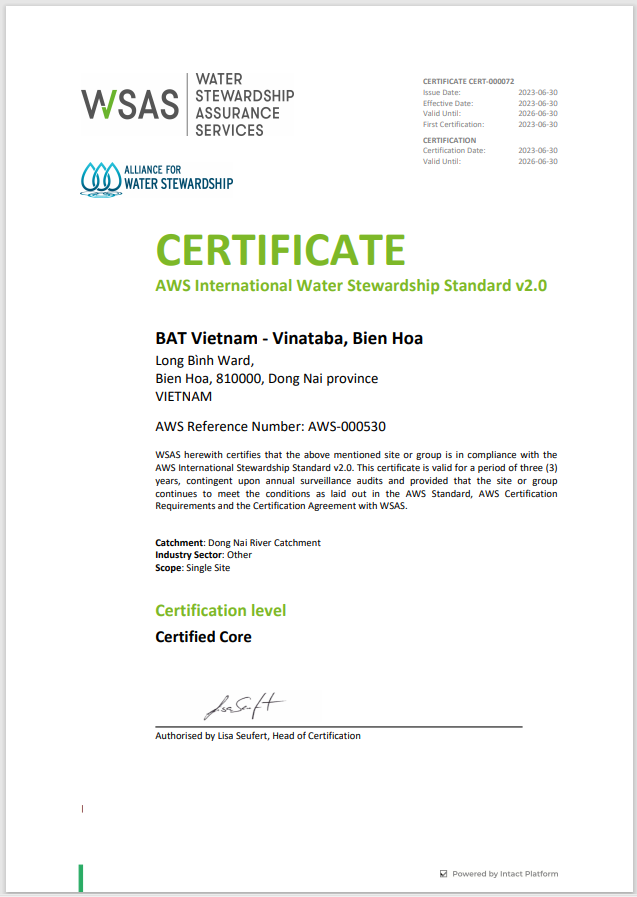 |
| The AWS certificate for the BAT-Vinataba joint venture factory in Dong Nai |
In 2024, BAT Vietnam has set clear water targets of a 32 per cent reduction of water from the water supply plants and a 34 per cent increase in the use of recycled water compared to the 2017 baseline.
These commitments at BAT Vietnam aim to encompass a 35 per cent cut of water use from water supply plants and the use of 35 per cent of recycled water compared to the 2017 baseline, with all BAT Vietnam’s factories being certified by the AWS.
Across the value chain, BAT Vietnam has worked with farmers to control irrigation and drainage, introducing a drip irrigation system to conserve water resources.
In 2023, the third year of implementing this system, the total area applying drip irrigation in the Central Highlands by farmers in BAT Vietnam’s supply chain reached 1,167 hectares, helping to save 1.26 million cu.m of water.
In 2024, the business aims to upgrade the drip irrigation system to reach around 1,750ha, expected to save 1.8 million cu.m of water per crop compared to conventional furrow irrigation methods. BAT Vietnam will also continue to closely collaborate with and incentivise farmers in its supply chain to invest in this technology.
On World Water Day this year on March 22, the company kicked off collaboration with environmental volunteer groups Saigon Xanh and Bien Hoa Xanh to support clean-up activities along canals and rivers in Ho Chi Minh City and Dong Nai province.
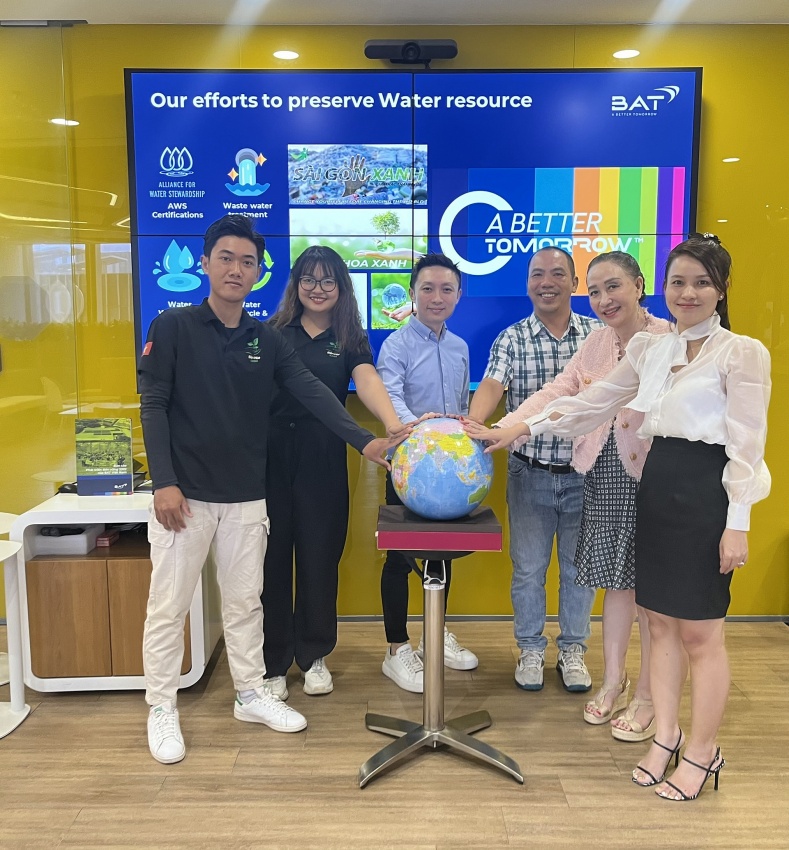 |
| BAT Vietnam to support environmental volunteer groups with water clean-up activities |
Specifically, the business will have its partner Thai An, a provider of labour protection solutions, to provide personal protective equipment and cleaning tools to “rescue” 30 canals and rivers in Ho Chi Minh City and Dong Nai, where BAT Vietnam is operating in 2024.
The 2012 Water Resources Law has been implemented over the past 10 years, bringing many positive changes in raising awareness and promoting action of the entire society in protecting and using water resource. In particular, water resource management strategies and initiatives taken by enterprises significantly contribute to this journey.
Among the 17 Sustainable Development Goals (SDGs) of the United Nations, “Clean water and Sanitation” is SDG 6, which is on track or maintaining SDG achievement in Vietnam, according to the Sustainable Development Report 2023, a global assessment of countries’ progress towards achieving the sustainable development goals.
That said, clean water remains a concern of our country nowadays. Climate change, global warming, natural disasters, and floods cause risks of water resource degradation and depletion. At the same time, the rising population and development necessitate increased supply.
Recently, the story of “the thirsty Mekong Delta,” reflecting the lack of clean water due to drought and salinity, has once again imposed a problem of clean water sources.
As an important part of the sustainable development landscape in Vietnam, the business community has been making unwavering efforts to accompany the government in effective water resource management. This also helps ensure seamlessness and sustainability in enterprises’ operations and production activities. Many businesses also consider water management the key focus of their business development programme when farming is a crucial part of their value chains.
As the business scale expands, the demand for water is increasing. It is undeniable that water is an essential resource in life and production. Therefore, stopping water use has never been feasible.
To ensure the implementation of the dual goal of maintaining production and conserving water resources, businesses today prioritise researching and implementing initiatives to reduce water use and increase water recycling and reuse in their own operations chains.
Particularly in businesses with production models associated with agricultural activities, expanding water resource management throughout the value chain is a real need.
According to the World Bank, agriculture accounts for an average of 70 per cent of global freshwater withdrawals. Common water management methods in farming include proactive water ownership, water collection, water storage, irrigation and drainage control, and many more.
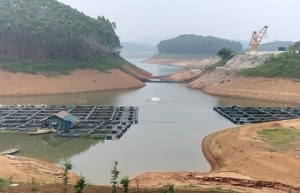 | Water management requires clear responsibilities from ministries: Experts Experts have said that it is necessary to develop a mechanism that could radically address the ongoing shortcomings regarding national water management. |
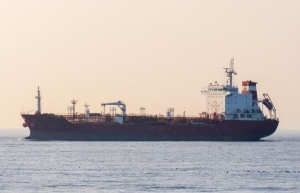 | Vietnam joins ballast water management convention The Government has agreed that Vietnam will join the International Convention for the Control and Management of Ships' Ballast Water and Sediments (BWM). |
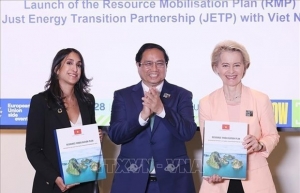 | Vietnam launches Resource Mobilisation Plan for Just Energy Transition Partnership During the World Leaders Summit at COP28 on December 1, Vietnamese Prime Minister Pham Minh Chinh launched the Resource Mobilisation Plan (RMP), which marks a key milestone towards the implementation of the Just Energy Transition Partnership. |
What the stars mean:
★ Poor ★ ★ Promising ★★★ Good ★★★★ Very good ★★★★★ Exceptional
Latest News
More News
- $100 million initiative launched to protect forests and boost rural incomes (January 30, 2026 | 15:18)
- Trung Nam-Sideros River consortium wins bid for LNG venture (January 30, 2026 | 11:16)
- Vietnam moves towards market-based fuel management with E10 rollout (January 30, 2026 | 11:10)
- Envision Energy, REE Group partner on 128MW wind projects (January 30, 2026 | 10:58)
- Vingroup consults on carbon credits for electric vehicle charging network (January 28, 2026 | 11:04)
- Bac Ai Pumped Storage Hydropower Plant to enter peak construction phase (January 27, 2026 | 08:00)
- ASEAN could scale up sustainable aviation fuel by 2050 (January 24, 2026 | 10:19)
- 64,000 hectares of sea allocated for offshore wind surveys (January 22, 2026 | 20:23)
- EVN secures financing for Quang Trach II LNG power plant (January 17, 2026 | 15:55)
- PC1 teams up with DENZAI on regional wind projects (January 16, 2026 | 21:18)
















 Mobile Version
Mobile Version